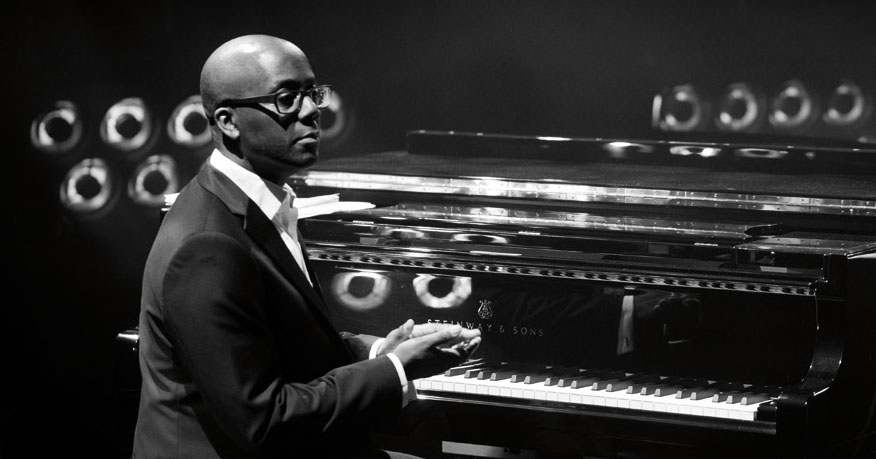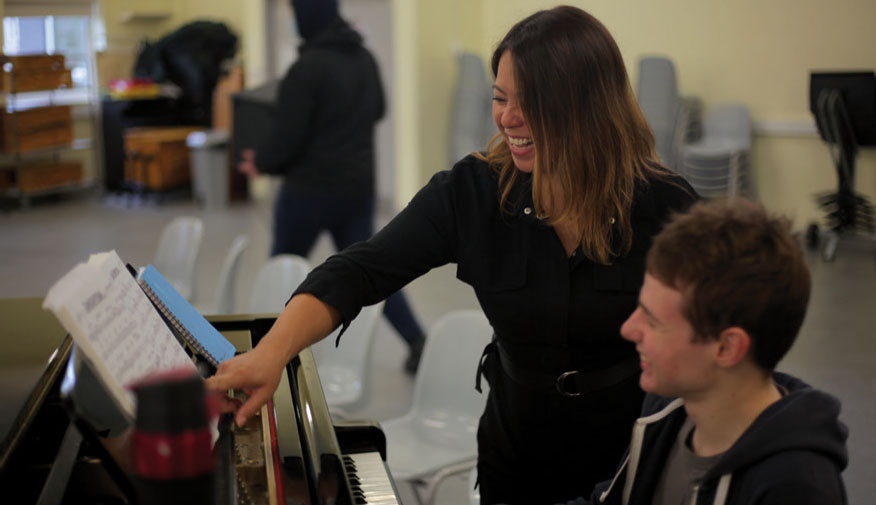
As circumstances have dictated in recent years, learning doesn't always take place in a classroom. For those who aren't able to access formal training, the best lessons might come from online tutorials, recordings, or hanging around other musicians, as was the case for Nikki Yeoh. Largely self-taught, Yeoh likens nights out at Ronnie Scott's to an ‘unofficial course’ – the prestigious jazz club became ‘a university’ for the young pianist. ‘If you were a Musicians’ Union member you could get a membership to Ronnie Scott's for £15 and entry would cost £3 Monday to Thursday – I used to cycle over there almost every night. I'd tap the musicians to get lessons and quite often they didn't charge me anything.’
These musicians included Chucho Valdés, who Yeoh later studied with in Cuba, before going on to work with Courtney Pine, George Martin and Nigel Kennedy, as well as having a solo career in her own right. She's taught in Camden for over 20 years, working mainly with young people, and has just been appointed as a tutor at Leeds Conservatoire.

Robert Mitchell © S. CROPPER
Teaching on the job
‘I haven't been part of a faculty like this before. I come from a working-class background and even for me to do A Levels was seen as unusual,’ says Yeoh. ‘I think lived experience is important for jazz musicians. That said, jazz can be very academic. To transcribe someone's solo, analyse it and incorporate ideas in your own language is complex. You're essentially studying dialects – every jazz musician has their own interpretation. It's the same level of skill that Glenn Gould applied to understanding Bach or Maurizio Pollini has to Beethoven. A microscopic attention to detail and life-long quest is required to find an individual language. Jazz musicians are some of the most studious people you could meet; whether it's from a formal or autodidactic path, we tend to seek further development within the idiom.’
Yeoh joined the department at the same time as fellow pianist Robert Mitchell, who also brings a wealth of industry experience. Mitchell recently released his eleventh album Zeitgeist – a collaboration with cellist Shirley Smart, who teaches improvisation and musicianship at the Royal College of Music Junior Department and is head of performance at City University – and has toured internationally. Mitchell is principal lecturer at Leeds; he took a more traditional career path, studying at City University and Guildhall. His undergraduate degree was a Music MSc, something that he ‘still struggles to explain’ – essentially, it was a precursor to music technology. Mitchell is curious about the long-term positive impact that jazz courses at conservatoire level can have. ‘Although the department at Leeds is one of the oldest, we're only a few generations into seeing what it means,’ he says.
Leeds Conservatoire – formally Leeds College of Music, having changed its name in 2020 – was one of the first institutions in the UK to offer jazz at higher education level. The conservatoire started life as Leeds Music Centre, providing a Light Music course with a significant focus on jazz. In 1993 it became the first institution in Europe to offer a jazz degree; the programme is now led by Jamil Sheriff and tutors include trombonist Kevin Holbrough and guitarist Jiannis Pavlidis.
As an all-Steinway institution, pianists are guaranteed the very best instruments – Yeoh describes the keyboards as an absolute treat to play. Most of the lecturers are practising jazz musicians, like Yeoh and Mitchell. ‘When you know your tutor is a real-life performer and is out there doing gigs it makes a big difference,’ says Yeoh. ‘I used to study with Ian Carr [an associate professor at the Guildhall School of Music and Drama who wrote biographies of musicians Keith Jarrett and Miles Davis] and he'd turn up at the portakabin in Kentish Town where we had our lessons with his suitcase and trumpet, having come straight from a tour. We listened to him because he knew what he was talking about.’
Get your thing together
At ‘Strengthening Music in Society: The way forward for UK Conservatoires’, a recent conference hosted by the Institute for Social Impact Research in the Performing Arts at Guildhall School of Music & Drama, there was discussion about how solo classical performance still tends to be treated as the ultimate achievement in conservatoires, and the ways in which the institutions could support wider music making, including jazz. There's also an emphasis on understanding the context in which music was made. ‘Learning about heritage and struggles is important,’ says Mitchell. ‘For example, I don't think we can consider Lili Boulanger and Cecil Taylor's artistic contribution without thinking about the discrimination they encountered.’
Most jazz musicians believe that regular jamming sessions are critical to a player's development. A space to collaborate and play freely can make or break a performer's improvisations. Both Yeoh and Mitchell played with Tomorrow's Warriors, the London education organisation founded in 1991 by Gary Crosby and Janine Irons that gives promising students from diverse backgrounds opportunities to learn and develop. Yeoh describes pretending to leave the room to get a glass a water when leading group lessons, to observe the changes in musical interaction. As with most things, a relaxed and safe space tends to lead to the best quality of performance. In addition to her teaching in Leeds, Yeoh has started working with Music Education Islington, where she'll facilitate sessions for under 18s to jam together.
‘Jam sessions are really how you get your thing together in jazz, and these are mainly held in clubs so it's difficult for young people to get experience,’ she says. Her new course ‘Jazz, Funk, Fusion, Afrobeat, Experimental and beyond band practice’ is taught at Music Education Islington's new music centre at Elizabeth Garret Anderson School every Monday term-time from 4:30–6:30pm. (Any person aged 6–18 who is confident to play all 12 notes on their instrument can join, and discounts are given to those who live or attend school in Islington. Bursaries are available.)

Nikki Yeoh teaching in Camden © RIO REDWOOD-SAWYER
Forming your own voice – that dialect – is so important in jazz. ‘Something amazingly played but derivative feels like its missing something,’ agrees Mitchell. Although jazz is becoming more accessible, the tradition of jam sessions can be intimidating for some. The ‘women in music’ sessions held at the Southbank Centre often discuss experiences of sexism in jazz, which involves anything from being told that girls can't play certain instruments (a belief still held in certain quarters) to players being side-lined in rehearsals (and worse). Leeds Conservatoire is holding Jazz Camp for Girls on 5 March to offer 9- to 15-year-olds the opportunity to learn from professional musicians and build their confidence. (The session costs £30, with discounts for siblings and free passes for those studying in Leeds.)
Finding a path
Teaching jazz is about enabling young musicians to find self-sufficiency and their particular style. ‘As much as we'd love to have a set of instructions to live, everyone is unique and has to find their own path,’ says Mitchell. For both Yeoh and Mitchell, composition is a crucial part of their musical expression. Mitchell recently wrote Good Trouble, Necessary Trouble based upon the life and achievements of US civil rights icon, John Lewis, and Our Hearts Dance The Infinite (While The Giant Puya Blooms), a left-hand only piece that has just been recorded by pianist Yuki Negishi and will be released via Quartz. ‘It's important to derive inspiration from figures from history,’ says Mitchell, ‘I admire people who are unmistakeably themselves and have an individual voice.’
Yeoh's new composition Nucleus, commissioned by the National Youth Jazz Orchestra, will be premiered later this year. It is dedicated to her teacher, Ian Carr, and all those educators who give up their weekends to teach young musicians. ‘I've given up pretty much every Saturday morning for the last 25 years,’ says Yeoh, ‘and it's worth it!’
www.gsmd.ac.uk/youth_adult_learning/music_education_islington








